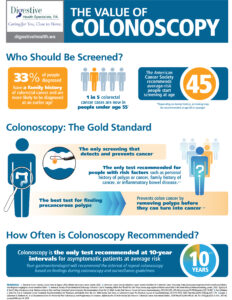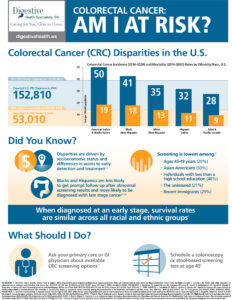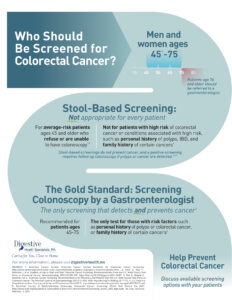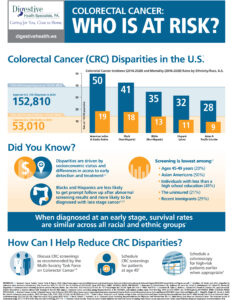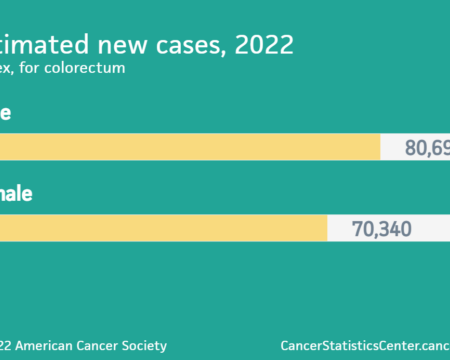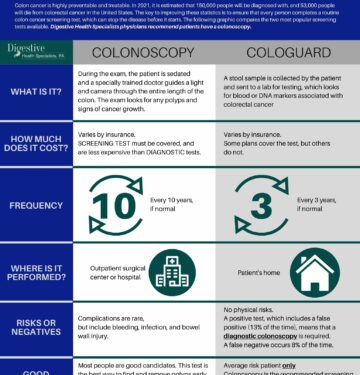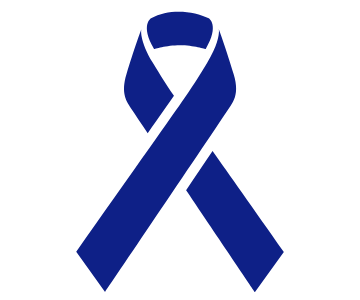Digestive Health Specialists, PA is here to help if you, or someone you know, would like more information or if you are experiencing any digestive health symptoms and would like further evaluation. Feel free to call us at 336-768-6211 or fill out the form below.
Colon Cancer Screening: Safeguarding Community Health Through Early Detection
As a disease with potentially devastating consequences, colon cancer demands our unwavering attention and concerted efforts toward early detection and prevention, which is why proactive screening for colorectal cancer is pivotal. Let’s explore the critical importance of colon cancer screening in fostering community health and the latest screening guidelines, and shed light on the symptoms that warrant vigilance.
Understanding the Significance of Colon Cancer Screening
Colorectal cancer, encompassing cancers of the colon and rectum, is the third most common cancer in the United States but is now the leading cause of cancer death in men under the age of 50 and second in women under 50 in the U.S. However, what sets this disease apart is its remarkable potential for prevention and early detection through routine screening measures.
Colon cancer often begins as benign growths called polyps, which, over time, may progress into cancerous lesions. By detecting and removing these precancerous polyps during screening procedures, clinicians can effectively intervene before malignancy takes root, significantly reducing the likelihood of disease progression and improving patient outcomes.
The Collective Impact: How Screening Enhances Community Health
- Reduction in Cancer Incidence and Mortality: The cornerstone of any effective public health strategy lies in prevention, and colon cancer screening is a great example of this. By identifying and treating precancerous lesions early, screening programs serve as a support against the relentless advance of this disease, ultimately decreasing and slowing down its incidence and mortality rates within the community.
- Promotion of Health Equity: Accessible and equitable screening programs ensure that all members of the community, regardless of socioeconomic status or background, have the opportunity to receive life-saving preventive measures. By bridging gaps in healthcare disparities, screening initiatives foster a more inclusive and resilient community health infrastructure.
- Financial Savings: Beyond the immeasurable human toll, colon cancer exacts a significant economic burden on healthcare systems and society at large. By preemptively detecting and treating the disease at an early stage, screening programs yield substantial cost savings by averting the need for expensive and intensive interventions associated with advanced-stage cancer care.
- Empowerment Through Knowledge: Knowledge is a powerful tool in the fight against cancer, empowering individuals to make informed decisions about their health and well-being. By raising awareness about the importance of screening and dispelling misconceptions surrounding the procedure community-wide education initiatives foster a culture of proactive health-seeking behavior.
Latest Screening Guidelines and Recommendations
- Starting Age: The American Cancer Society recommends initiating routine screening for colorectal cancer at age 45 for average-risk individuals, acknowledging the rising incidence of the disease among younger demographics.
- Screening Modalities: Several screening modalities are available but colonoscopies are considered the gold standard for colorectal cancer screening because it enables the detection of precancerous polyps (adenomas) and early-stage cancers that may not be detectable through other screening methods. During the procedure, clinicians can not only identify suspicious lesions but also perform interventions such as polyp removal (polypectomy) or tissue biopsy, thereby mitigating the risk of cancer development or progression. During a colonoscopy, the clinician inserts a flexible scope into the colon to visualize the colon lining directly.
- Screening Interval: The recommended screening interval varies depending on the chosen modality and individual risk factors. For instance, average-risk individuals undergoing a colonoscopy with no family history and no history of polyps may require repeat screening every 10 years while other screening tests require more frequent screening intervals.
- Individual Risk Assessment: It’s important to note that screening recommendations may differ for individuals with specific risk factors, such as a family history of colorectal cancer, personal history of inflammatory bowel disease, or hereditary cancer syndromes. Personalized risk assessment in consultation with a healthcare provider is essential to optimize screening strategies.
Recognizing Symptoms and Red Flags
While screening serves as the cornerstone of early detection, it’s imperative to remain vigilant for potential warning signs of colorectal cancer. Common symptoms may include:
- Persistent changes in bowel habits, such as diarrhea or constipation
- Rectal bleeding or blood in the stool
- Abdominal discomfort, cramping, or pain
- Unexplained weight loss
- Fatigue or weakness
- Iron deficiency anemia
Individuals experiencing any of these symptoms should promptly consult a healthcare professional for further evaluation and guidance.
The importance of colorectal cancer screening cannot be overstated. By embracing preventive measures and adhering to the latest screening guidelines, we safeguard individual health and cultivate a resilient thriving community. Let’s seize the opportunity to champion early detection, empower individuals through education, and forge a collective path toward a future free from colorectal cancer.
Learn more about colorectal cancer in the documents linked below:


